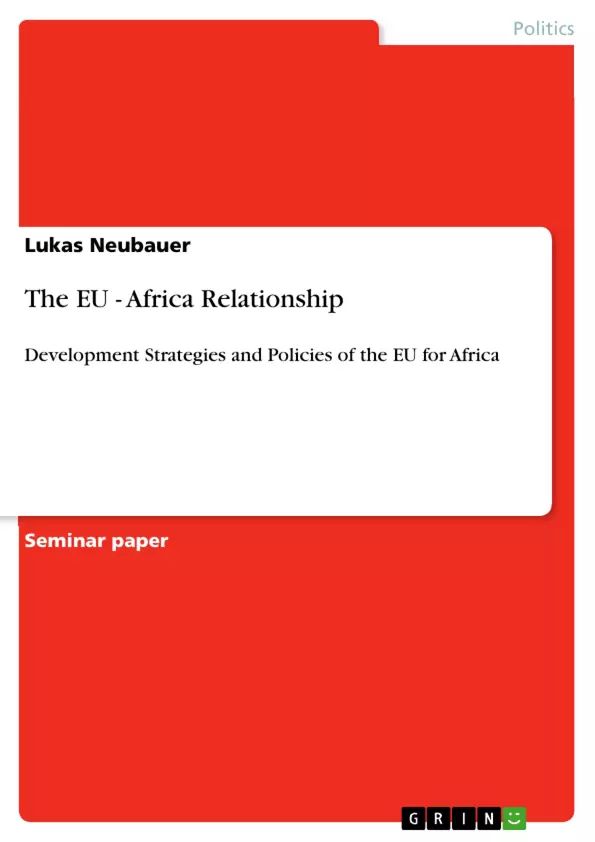In the sense of most people poverty, underdevelopment and worse living conditions are directly connected to the continent of Africa and the people living there. Furthermore Africa has been exploited by other nations and distressed by internal military and non-military conflicts. This is why most nations all over the world have identified the need of help, although it is sometimes done for their own purpose. This paper will focus on the EU development strategy and policy for the African continent. First of all I will explain the legal foundation and principles of the Union’s Africa strategy. Secondly I’ll try to identify the most important impacts on the changing relationship between Africa and the EU since the 1950s. This will be followed by a detailed insight into the history of common European Development Policy from the times of the EEC to the Treaty of Cotonou. After that I want to focus on the actual relationship, especially the Lisbon Declaration and the joint strategy for Africa. Last but not least there will be a short evaluation if this strategy is or even could be successful. In the end I will sum up my results and connect them to my own opinion.
Inhaltsverzeichnis (Table of Contents)
- INTRODUCTION.
- THE LEGAL FOUNDATION AND PRINCIPLES OF THE EU DEVELOPMENT POLICY.
- INFLUENCING FACTORS ON THE CHANGING EU-AFRICA RELATIONSHIP.
- THE DEVELOPMENT OF THE EUROPEAN DEVELOPMENT POLICY
- THE EARLY BEGINNINGS: FROM ROME TO YAOUNDÉ
- THE LOMÉ CONVENTIONS
- THE TREATY OF COTONOU
- THE ACTUAL EU-AFRICAN RELATIONSHIP.
- CONTENT OF THE ACTUAL PARTNERSHIP
- EVALUATION OF THE STRATEGY
- CONCLUSION.
Zielsetzung und Themenschwerpunkte (Objectives and Key Themes)
This paper examines the EU's development strategy and policy for the African continent. It analyzes the legal foundation and principles of the EU's Africa strategy, explores the major impacts on the changing relationship between Africa and the EU since the 1950s, and provides a historical overview of common European Development Policy from the EEC to the Treaty of Cotonou. The paper also focuses on the current relationship, particularly the Lisbon Declaration and the joint strategy for Africa, and evaluates the potential success of this strategy. The paper concludes with a summary of findings and the author's personal opinion.
- The legal foundation and principles of the EU's development policy for Africa
- The key factors influencing the changing relationship between the EU and Africa
- The historical development of the EU's development policy for Africa
- The current EU-Africa partnership, including the Lisbon Declaration and the joint strategy for Africa
- Evaluation of the effectiveness of the EU's development strategy for Africa
Zusammenfassung der Kapitel (Chapter Summaries)
- Introduction: The paper introduces the topic of the EU's development policy for Africa and outlines the structure and key themes of the paper.
- The Legal Foundation and Principles of the EU Development Policy: This chapter explores the legal basis of the EU's development policy, drawing on the Treaty of Rome, the Treaty on Establishing the European Union, and the EU's commitment to the Millennium Development Goals. It also examines the principles of subsidiarity, coherence, and regionalisation.
- Influencing Factors on the changing EU-Africa Relationship: This chapter examines the factors that have shaped the EU-Africa relationship over time, including the process of decolonisation, the emergence of independence movements, changes in the geo-political climate, advances in European integration, and the role of security and economic interests.
- The Development of the European Development Policy: This chapter provides a historical overview of the EU's development policy, focusing on the early beginnings (from Rome to Yaoundé), the Lomé Conventions, and the Treaty of Cotonou.
Schlüsselwörter (Keywords)
Key terms and concepts explored in this paper include: European Development Policy, EU-Africa relationship, decolonisation, independence movements, Treaty of Rome, Treaty on Establishing the European Union, subsidiarity, coherence, regionalisation, Millennium Development Goals, Lomé Conventions, Treaty of Cotonou, Lisbon Declaration, joint strategy for Africa, security policy, economic interests, and development aid.
Frequently Asked Questions
What are the core principles of the EU's development policy for Africa?
The policy is built on principles of subsidiarity, coherence, regionalization, and a commitment to the Millennium Development Goals.
How has the relationship between the EU and Africa evolved historically?
The relationship has transitioned from colonial ties to early agreements like the Treaty of Rome, through the Lomé Conventions, and finally to the current Cotonou Agreement and Lisbon Declaration.
What is the significance of the Cotonou Agreement?
The Treaty of Cotonou represents a major pillar in European Development Policy, focusing on a comprehensive partnership between the EU and ACP (African, Caribbean, and Pacific) states.
What factors have influenced changes in EU-Africa ties?
Key factors include decolonization, independence movements, geopolitical shifts, advances in European integration, and evolving economic and security interests.
What is the Lisbon Declaration in the context of Africa?
The Lisbon Declaration outlines the joint strategy for the actual EU-African relationship, focusing on a modern partnership beyond traditional development aid.
- Quote paper
- Lukas Neubauer (Author), 2009, The EU - Africa Relationship , Munich, GRIN Verlag, https://www.grin.com/document/154289



